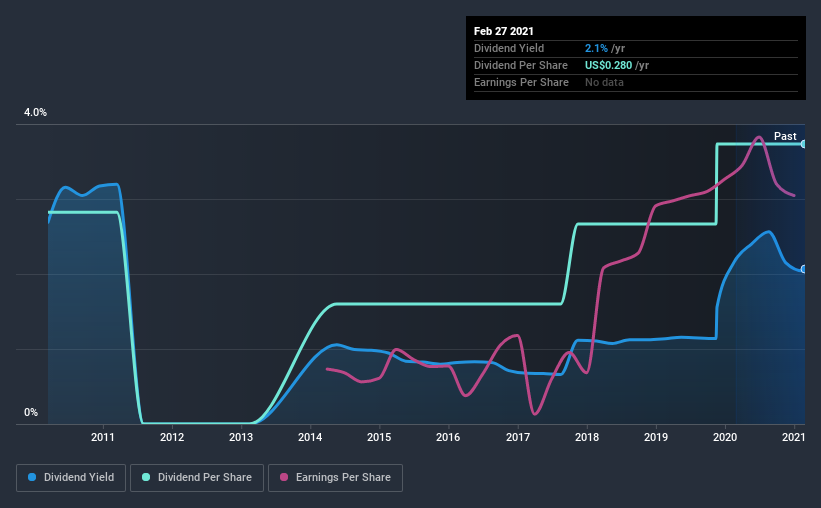- United States
- /
- Mortgage Finance
- /
- NasdaqGM:PBIP
Why You Might Be Interested In Prudential Bancorp, Inc. (NASDAQ:PBIP) For Its Upcoming Dividend
Prudential Bancorp, Inc. (NASDAQ:PBIP) stock is about to trade ex-dividend in 4 days. Ex-dividend means that investors that purchase the stock on or after the 5th of March will not receive this dividend, which will be paid on the 22nd of March.
Prudential Bancorp's next dividend payment will be US$0.07 per share, on the back of last year when the company paid a total of US$0.28 to shareholders. Based on the last year's worth of payments, Prudential Bancorp stock has a trailing yield of around 2.1% on the current share price of $13.55. We love seeing companies pay a dividend, but it's also important to be sure that laying the golden eggs isn't going to kill our golden goose! As a result, readers should always check whether Prudential Bancorp has been able to grow its dividends, or if the dividend might be cut.
View our latest analysis for Prudential Bancorp
If a company pays out more in dividends than it earned, then the dividend might become unsustainable - hardly an ideal situation. Fortunately Prudential Bancorp's payout ratio is modest, at just 26% of profit.
When a company paid out less in dividends than it earned in profit, this generally suggests its dividend is affordable. The lower the % of its profit that it pays out, the greater the margin of safety for the dividend if the business enters a downturn.
Click here to see how much of its profit Prudential Bancorp paid out over the last 12 months.

Have Earnings And Dividends Been Growing?
Stocks in companies that generate sustainable earnings growth often make the best dividend prospects, as it is easier to lift the dividend when earnings are rising. If earnings decline and the company is forced to cut its dividend, investors could watch the value of their investment go up in smoke. That's why it's comforting to see Prudential Bancorp's earnings have been skyrocketing, up 32% per annum for the past five years.
Another key way to measure a company's dividend prospects is by measuring its historical rate of dividend growth. Prudential Bancorp has delivered an average of 2.8% per year annual increase in its dividend, based on the past 10 years of dividend payments. It's good to see both earnings and the dividend have improved - although the former has been rising much quicker than the latter, possibly due to the company reinvesting more of its profits in growth.
To Sum It Up
From a dividend perspective, should investors buy or avoid Prudential Bancorp? Companies like Prudential Bancorp that are growing rapidly and paying out a low fraction of earnings, are usually reinvesting heavily in their business. This is one of the most attractive investment combinations under this analysis, as it can create substantial value for investors over the long run. We think this is a pretty attractive combination, and would be interested in investigating Prudential Bancorp more closely.
With that in mind, a critical part of thorough stock research is being aware of any risks that stock currently faces. Every company has risks, and we've spotted 1 warning sign for Prudential Bancorp you should know about.
A common investment mistake is buying the first interesting stock you see. Here you can find a list of promising dividend stocks with a greater than 2% yield and an upcoming dividend.
If you’re looking to trade Prudential Bancorp, open an account with the lowest-cost* platform trusted by professionals, Interactive Brokers. Their clients from over 200 countries and territories trade stocks, options, futures, forex, bonds and funds worldwide from a single integrated account. Promoted
New: Manage All Your Stock Portfolios in One Place
We've created the ultimate portfolio companion for stock investors, and it's free.
• Connect an unlimited number of Portfolios and see your total in one currency
• Be alerted to new Warning Signs or Risks via email or mobile
• Track the Fair Value of your stocks
This article by Simply Wall St is general in nature. It does not constitute a recommendation to buy or sell any stock, and does not take account of your objectives, or your financial situation. We aim to bring you long-term focused analysis driven by fundamental data. Note that our analysis may not factor in the latest price-sensitive company announcements or qualitative material. Simply Wall St has no position in any stocks mentioned.
*Interactive Brokers Rated Lowest Cost Broker by StockBrokers.com Annual Online Review 2020
Have feedback on this article? Concerned about the content? Get in touch with us directly. Alternatively, email editorial-team (at) simplywallst.com.
About NasdaqGM:PBIP
Flawless balance sheet with moderate growth potential.
Market Insights
Community Narratives



